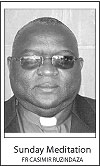The liturgy of the nineteenth Sunday in ordinary time is based on the following readings: 1 Kings 19:9a, 11-13a; Psalm 85; Romans 9:1-5; Matthew 14:22-33. The main theme of these readings is on how God appears to his people in natural phenomena. In the first reading the prophet Elijah is surprised by his encounter with Yahweh in a seemingly simple wind.


The liturgy of the nineteenth Sunday in ordinary time is based on the following readings: 1 Kings 19:9a, 11-13a; Psalm 85; Romans 9:1-5; Matthew 14:22-33.
The main theme of these readings is on how God appears to his people in natural phenomena. In the first reading the prophet Elijah is surprised by his encounter with Yahweh in a seemingly simple wind.
He was running for his life from the death threats of Jezebel and then rested in a cave on Mt. Horeb; God’s mountain. Then he recognized Yahweh’s voice. It was in a light, murmuring sound of a very gentle wind.
The prophet would have expected Yahweh’s voice to come in the mighty hurricane, or accompanied by the earthquake, or some sort of fire! But Yahweh chose to manifest himself in a light, murmuring sound of a gentle wind which occurred almost everyday on Mt.Horeb.
In the Gospel, as the disciples were in the boat, frightened by the storm, they saw Jesus walking on the troubled water towards them amidst a strong storm. And when Jesus reached their boat, the storm subsides.
Peter who was excited by their encounter with Jesus, who controls nature, wants to walk on water too. He is encouraged by Jesus, but being human, he doubts whether he can really do what Jesus gives him the power to do. And his fear took over his faith.
The disciples like Prophet Elijah, learnt from their encounter with God, that God is in command of the laws of nature. Psalm 85 stresses this necessity of having faith in God who is omnipotent. It is a psalm of hope and faith for the returnees from exile.
They had no doubt that the Lord will bring a time of prosperity to those who are taking possession again of their lands after years in captivity.
In the second reading, St. Paul advises his fellow Israelites to learn from their own history; the miracles, favours and special treatments they had had from Yahweh and have faith in God. He wants them to recall that the fact that Christ was born in his earthly life among their community, is enough to strengthen their faith in God, because it was a way of manifesting himself to their community in a very special way.
The doctrinal point in our readings emphasizes the fact that in order to benefit from daily manifestation of God to us in our daily life, we must on our part turn ourselves to him in prayer.
Prayer is an essential part of Christian life. It is a time we set aside in order to turn our mind and the heart to the presence and the purposes of God.
Our prayer is to acknowledge God’s Lordship in our lives, to thank him for all that we receive, to ask for what we need and to pray for others’ physical and spiritual needs. In our liturgy, we are given an example of Elijah and Jesus in prayer.
Prayer can enlighten and strengthen our spirit to understand God’s wisdom, hence enabling us to encounter him in daily and natural phenomena.
From a pastoral point of view, we must examine our prayer life since it is an occasion which helps us to recognize God when he manifests himself to us. What should be our attitude toward prayer? Should it continue to be a routine habit as it happens to be for a number people?
There is a common incomprehension of what prayer should be in the mentality of our modern man. Is it a lucky charm, the last resort when all have failed us? Is it an obliged break in our many activities? Or is it an obligation to be fulfilled?
This kind of misunderstanding on what prayer is stems from our missing of the vital experience of real prayer and its basic purpose which is to praise and to thank God for what he is for us.
The kind of misunderstanding of prayer has been favoured by our modern culture which stresses an apparent self-sufficiency and our capacity to control the power of nature.
But this kind of mentality ignores the fact that in reality, there is a lot that happens independently of our decisions and our desires.
How much of what we earn or merit cannot be put to nothing by a minute of a catastrophe beyond our control? Prayer helps us to recognize the illusions of our invented securities and their true limits.
It helps us to come to terms with the true state of our human condition, the confusion and the fear of what we do not understand.
And it can move us to depend and trust in God who created us without our applications requesting him to do so. This Sunday’s liturgy invites us to turn our minds to the reality of God’s presence in our lives, and to prepare ourselves to engage God through prayer.
We must know of course that it is God, not us, who reveals himself to us. But in a certain sense, God’s manifestations to us require and depend on our proper dispositions, which remains a problem to the modern man seems to be destructed by a number of issues.
Ends


